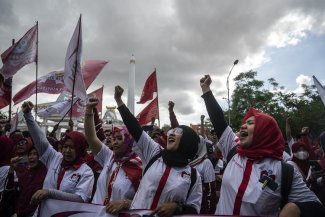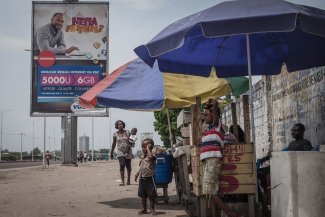“Where are the jobs coming from? The concern is about generating jobs in sufficient numbers but also quality as well.”
In his opening remarks for the ‘World of Work Summit’, ILO Director-General Guy Ryder said this was the most common question he had been asked over the course of the 102nd International Labour Conference (ILC), held in Geneva over the last two weeks.
The Summit, a high-level panel on how to restore confidence in jobs and growth, was held in the final days of the ILC and saw the participation of four speakers: Sharan Burrow, General Secretary, International Trade Union Confederation (ITUC), Carlos Lopes, Executive Secretary of the UN Economic Commission for Africa, Professor Yves Flückiger, Vice-Rector of the University of Geneva and Daniel Funes de Rioja, Executive Vice-President of the International Organization of Employers (IOE).
As the ILO prepares to celebrate its centenary in 2019, the panelists also discussed what the ILO could contribute to a new labour landscape.
However, the fundamental question remains ‘how do we help growth and create more jobs?’
According to Professor Flückiger “there needs to be a balance between the need to have decent salaries but making sure that salaries are not so high that workers are not priced out of the jobs’ market.”
As head of an organisation representing 175 million workers in 156 countries, Burrow countered that argument with:
“We say to the employers, of course you don’t want to price workers out of the labour markets, but if you don’t pay workers a wage which you can live on, your businesses are at risk.”
She called for “radical solutions” in the face of failed austerity measures, such as investment in infrastructure and targeted investment in jobs.
Burrow also highlighted the necessity of social protection floors, minimum wages and labour rights for any sustainable business.
Youth unemployment
The issue of youth employment was also a key topic in the address given at the ILC by European Council President Herman Van Rompuy on Friday.
There are currently 73.4 million young people worldwide – or 12.6 per cent of all 15 to 29-year-olds – that are expected to be out of work in 2013, up 3.5 million from 2007.
The situation is particularly bad in Europe where the youth unemployment rate is more than twice as high as the adult one – 23.3 per cent against 9.3 per cent in the fourth quarter of 2012.
“Financing the economy is, together with youth unemployment, the major topic for our next European Council summit,” he said, emphasising that the European Council has already redirected significant EU funds to help over 800,000 young people in the eight most affected countries in Europe.
He said that all EU countries have also signed up to the Youth Guarantee, which promises every young European with a good offer of employment, education or training within four months of leaving school or becoming unemployed.
“Positive outcomes”
Every year, during the ILC, the ILO tripartite constituents – meaning the representatives of 185 governments, employers and workers from all over the world – discuss 25 of the worst violations of labour rights in the world.
Last year the discussion was suspended, for the first time since the establishment of the ILO in 1919, as the employers opposed the idea that the right to strike was among the fundamental rights at work, an issue raised in some of the cases under consideration by the ILO supervisory bodies.
This year, the 25 countries were Honduras, Iran, Kenya, Uzbekistan, Pakistan, Paraguay, the Dominican Republic , Senegal, Swaziland, Chad, Turkey, Zimbabwe, Saudi Arabia, Bangladesh, Belarus, Cambodia, Canada, Korea, Egypt, Spain, Fiji, Greece, Guatemala, Malaysia and Mauritania.
There were a number of “positive outcomes” according to the Director of Human and Trade Union Rights at the ITUC, Stephen Benedict, who followed all the hearings.
“In a whole range of cases, the ILC provides us with a real opportunity to be updated on the latest situation facing our colleagues around the world. In Guatemala, for example, when our colleagues arrived at the ILC we found out about a number of new problems including a number of arbitrary dismissals in the municipality of Jalapa” Benedict told Equal Times.
“Other cases ranged from those where the violation of workers’ rights in countries like Guatemala and Swaziland has a profound impact on the lives of workers, to cases related to the Crisis, like the attack on collective bargaining in Greece and economic policy in Spain.”
When asked if he was happy with the conclusions of the sessions, Benedict replied: “Like any process of negotiations we seldom get all the conclusions we wanted but we always leave here with more than what we came here with.”
The situation in Fiji was one of the most important cases discussed last week.
Despite the “rather arrogant attitude” of the Fijian government at the plenary, it was concluded that the case of Fiji should be included in a special paragraph to this year’s conference, which Benedict described as “a real designation of shame”.
The next step is for the government to allow the ILO mission that was turned away earlier this year to return to Fiji and help bring the country’s laws into conformity with the ILO Conventions which they have ratified – particularly Convention 87 on Freedom of Association and Protection of the Right to Organise. This needs to happen before October.
“In the case of Paraguay, there was a strong consensus amongst workers, employers and a number government representatives that the [indigenous people] issue in the El Chaco region should be dealt with very aggressively.”









